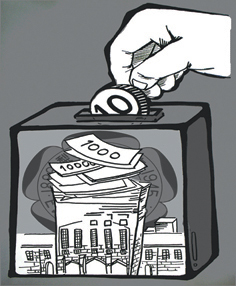
Ewha administrators are seeking to increase donations to the university in order to help it retain its position as a top school. According to a report by Grand National Party Congressman Lim Hae-gue, a total of 2.997 trillion won was raised by both national and private universities in
Ewha was the only women’s university to be ranked in the top 30s in the report, which covered donations from 2004 to 2006, and placed
“We can see that Ewha alumnae are making more donations compared to other women’s universities,” said Professor Lee Nan-hee, Department Chief of the Office of University Relations and Development (OURD). “However, the amount of the donations is less than that at other co-ed schools because more male graduates are in high-ranking positions in society compared to female graduates, making it harder for them to contribute.” However, the OURD is still happy to see many people including the President, faculty members, alumnae, current students and companies, donating a significant amount of money for Ewha’s development.
For instance, professors and students from the College of Music held a concert and raised funds to donate for tuition fees for students. Also, Professor Kim Kwang-ok (Food and Nutritional Sciences) agreed to donate 100 million won by donating 10 million won every year, hoping the money can help to attract many excellent students to their newly established major.
Also 49 alumni associations over the world work hard under the name of the International Foundation for
“Ewha graduates living abroad make small contributions frequently. They are more active in contributing as they are influenced by the donating culture of foreign countries, which favors small but frequent donations. It is important that donations are made continuously, regardless of the amount donated,” said Lee Nan-hee of the OURD.
Donations include small contributions by current Ewha students as well. In 2003, the OURD established the E-pro (2%) Fund Raising Campaign, which promotes the notion that, “donations can be made with two percent of students” pocket money.” Information can be found on the website (http://ewha21.ewhain.net) and the contribution money is given as scholarships, which have been delivered three times. Hwang Young-mi (Ceramic Arts, ’69) started to donate money through the E-pro program in 2005 after she got re-admitted in 2003 since the school regulation banning married students was abolished. She decided to contribute further in 2006 and said that she wishes to support fellow students while she is at Ewha studying for the second time. So far up to January, 2007, a total of 416 donations were made.
Ewha categorizes donations into six main funds; the Initiative Ewha Fund, the Construction Fund, the Ewha Love Scholarship Fund, the Project Fund, the Professor Research Fund and the E-pro Scholarship Fund. The Initiative Ewha Fund is used to support the Global Ewha 2010 Project and to construct education facilities in Paju. The Construction Fund is used to construct necessary buildings around the school campus, while the two scholarship funds (the Ewha Love Scholarship Fund and the E-pro Scholarship Fund) support students in financial difficulties. The Project and Professor Research funds are used to promote academic research.

